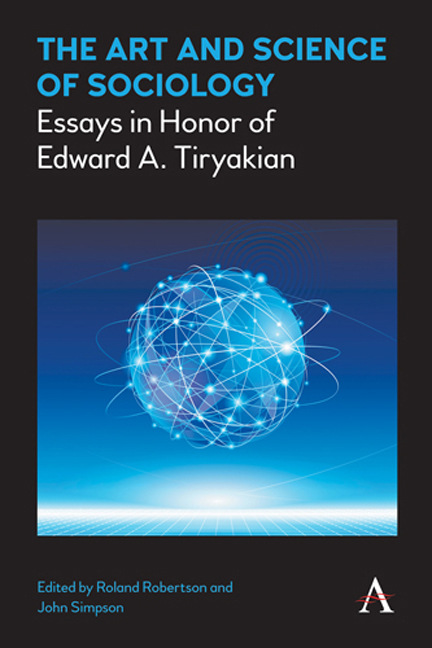Book contents
- Frontmatter
- Contents
- List of Figures and Tables
- List of Contributors
- Acknowledgments
- Introduction
- Chapter 1 The Dynamo and the Diplomat: Tiryakian's Role in Preserving Sorokin's Reputation
- Chapter 2 Edward Tiryakian and Modernization Theory: A Very Special Relationship
- Chapter 3 Developmental Path (Entwicklungsform): A Neglected Weberian Concept and Its Usefulness in the Civilizational Analysis of Islam
- Chapter 4 The Existential Sociology of Edward Tiryakian: Toward an Integrated Paradigm
- Chapter 5 Comparative Reflections on Sociology and Conservatism: The Contributions of Edward A. Tiryakian
- Chapter 6 Contemporary Changes in the Processes of Social Differentiation: Toward an Analytical Version of the Theory
- Chapter 7 Considerations on Global Studies
- Chapter 8 Honoring Edward Tiryakian as a Metasociologist: A Metaconceptual Analysis of Prosumption and Related Concepts
- Chapter 9 Dangerous Nouns of Process: Differentiation, Rationalization, Modernization
- Chapter 10 Modernization as Social Becoming: Ten Theses on Modernization
- Chapter 11 Religion and Evolution
- Chapter 12 The “Axial Age” vs. Weber's Comparative Sociology of the World Religions
- Edward A. Tiryakian's Publications
- Index
Chapter 9 - Dangerous Nouns of Process: Differentiation, Rationalization, Modernization
Published online by Cambridge University Press: 22 July 2017
- Frontmatter
- Contents
- List of Figures and Tables
- List of Contributors
- Acknowledgments
- Introduction
- Chapter 1 The Dynamo and the Diplomat: Tiryakian's Role in Preserving Sorokin's Reputation
- Chapter 2 Edward Tiryakian and Modernization Theory: A Very Special Relationship
- Chapter 3 Developmental Path (Entwicklungsform): A Neglected Weberian Concept and Its Usefulness in the Civilizational Analysis of Islam
- Chapter 4 The Existential Sociology of Edward Tiryakian: Toward an Integrated Paradigm
- Chapter 5 Comparative Reflections on Sociology and Conservatism: The Contributions of Edward A. Tiryakian
- Chapter 6 Contemporary Changes in the Processes of Social Differentiation: Toward an Analytical Version of the Theory
- Chapter 7 Considerations on Global Studies
- Chapter 8 Honoring Edward Tiryakian as a Metasociologist: A Metaconceptual Analysis of Prosumption and Related Concepts
- Chapter 9 Dangerous Nouns of Process: Differentiation, Rationalization, Modernization
- Chapter 10 Modernization as Social Becoming: Ten Theses on Modernization
- Chapter 11 Religion and Evolution
- Chapter 12 The “Axial Age” vs. Weber's Comparative Sociology of the World Religions
- Edward A. Tiryakian's Publications
- Index
Summary
My objective in this essay is pretty clear from its title. It is to sound the alert about dangerous nouns of process, nouns that lead sociologists astray whenever they try to use them to place their analyses of the contemporary world on a historical foundation. These nouns of process also exercise a detrimental effect beyond the boundaries of sociology when other scholars, such as historians, see them as a source of theoretical guidance that is already well-tried in the social sciences. To explain the sharp tone of my warning, I must begin with a fairly detailed historical retrospective. We have to go back to the relationship between sociology and history during the period when the former was getting off the ground, paying special attention to the role of the topic of religion in this process.
Sociology has a number of roots as an independent academic discipline. It has absorbed: philosophical ideas, sometimes with anthropological underpinnings, about the nature of human social relations; enquiries into social problems of social reformist intent (on poverty, alcoholism, criminality, divorce); attempts to analyze the modern world; and models for systematizing the mass of historical and ethnological knowledge generated by the nineteenth century. When all goes well, the fusion of these disparate strands produces brilliant writings of broad interdisciplinary resonance. When things go awry, the discipline often threatens to disintegrate into its constituent elements, into disciplinary subcultures that have little to say to one another and that feel greater rapport with neighboring subjects than with their originary discipline.
If we go by university curricula, however, we do at least find a fair degree of internal cognitive stability within the discipline of sociology, in two respects. A specific canon of empirical methods of data collection and data analysis enjoys undisputed status. For many people, then, the discipline's professional identity consists chiefly in these methods. But there is also consensus with respect to classical sociological theory. Throughout the world, sociologists unanimously agree that sociology's core canon is centered on the work of two authors, namely Max Weber and Emile Durkheim, and a good knowledge of both is an absolute prerequisite for membership in the disciplinary community. This fact can, however, easily blind us to the improbability of this theoretical canon.
- Type
- Chapter
- Information
- The Art and Science of SociologyEssays in Honor of Edward A. Tiryakian, pp. 149 - 162Publisher: Anthem PressPrint publication year: 2016



